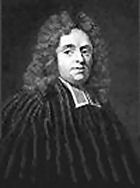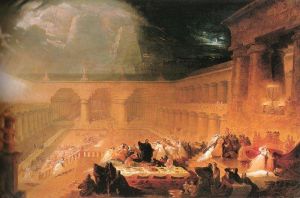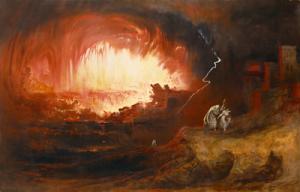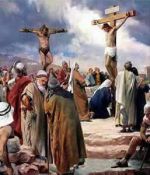“When Jesus had received the sour wine, he said, ‘It is finished,’ and he bowed his head and gave up his spirit.” – John 19:30
 These are some of the most hope-filled, joy-inflicting, theologically deep words ever spoken by our Savior, for the edification of His people. When Jesus said, “It is finished,” we who love Christ have much reason to rejoice. Paul expounded upon this joy in Romans 5:6-11, amongst other places. With such force, Jesus makes a proclamation about eternally deep things that have just occurred upon the cross. What are these things? What is it that had been accomplished?
These are some of the most hope-filled, joy-inflicting, theologically deep words ever spoken by our Savior, for the edification of His people. When Jesus said, “It is finished,” we who love Christ have much reason to rejoice. Paul expounded upon this joy in Romans 5:6-11, amongst other places. With such force, Jesus makes a proclamation about eternally deep things that have just occurred upon the cross. What are these things? What is it that had been accomplished?
1. The wrath of God was satisfied.
“The fear of the LORD is the beginning of wisdom; all those who practice it have a good understanding” (Psalm 111:10). God is holy. In American evangelicalism, it seems we have largely forgotten this aspect of God’s character, yet it pervades everything He does. Sermons are not preached on it though. Why? Because it is highly uncomfortable. We are a comfortable nation. We like things in bite-size chunks of information. We like positive, life-affirming messages, not dark, gloomy, terrifying messages. Yet as Tim Keller has said, “If we play down harsh doctrines, we will gut our pleasant and comfortable beliefs too.” God’s holiness makes us squirm, as it should. But we must not play it down, but proclaim it. The whole Gospel only makes sense when we see what it is we are being saved from. Merely preaching “God loves you” does no justice to the entirety of the Gospel we proclaim. The question is, “How has God loved us?” The Scriptures present all of this very clearly.
When seeing the holiness of God, Isaiah, one of the holiest men in Israel himself (who, if anyone had reason to stand because of righteousness, it was him), was shaken to the core of his being, riddled with fear, totally undone because of his own uncleanness in the presence of this holy, majestic, spiritually terrifying God who has always existed and full of infinite power that cannot be measured by any man. Jesus said, “And do not fear those who kill the body but cannot kill the soul. Rather fear him who can destroy both soul and body in hell” (Matthew 10:28). Isaiah, despite his holiness, was a sinner in the presence of the God of the universe that could crush him with a thought. This is the God we serve and should serve with a good level of reverential fear.
What does His holiness entail? Justice and righteous. It entails His Creator rights, to do whatever He wants with His own creation. God owes no one mercy. Isaiah got it. He knew he had no right to demand anything of God whatsoever. All he could do was fall on his face and beg for mercy because of His justice that should have squashed him. No one can tell God what He should or should not do. Job got it. At the end of the book, he put his hand over his mouth and said he had uttered things he did not understand against God. We throw the terms justice and righteousness around a lot in songs and in conversation, but what does it mean that God is just and righteous in relation to sinners, like us? It means that because of our sin, we should be thrown into the Lake of Fire described in detail in Revelation and spoken by Jesus in the Gospels more than any other person. These are not my words, they are Scripture and we must speak what it says boldly, without fear, yet do so in love.
Do we feel the weight of that in our souls, even as believers? Do you feel that bad off because of your sin? Consider how your sin has offended an infinitely holy God. Well we all should feel it, because the degree to which we feel our sinfulness and how much it has offended God on this infinite level, is the degree to which we will appreciate the work of the Gospel for us and specifically the words, “It is finished,” knowing that should have been us on that cross, for all eternity. Yet Christ, in His willing, submissive love, substituted Himself for those the Father had given Him before the world was made (John 6:37, Ephesians 1:3-6). Jesus drank the full cup of God’s just anger and wrath that had to be satisfied. And He did this in our place. So even as believers, though we have confident access to the throne of God through the blood of Christ, even when we sin, we should stand in awe and wonder that we have been spared an eternity of torment, knowing that by God’s choice alone and His doing in you (bringing you to faith by His power), we were spared by the work of Christ, not because of anything we’ve done past, present, or future, but simply because of God’s good pleasure to save us. Christ took God’s wrath in Himself upon the cross for us who believe. And after it was completed, He proclaimed these words, “It is finished.”
2. God’s name had been vindicated for having passed over former sins.
In Romans 3:25 we are told that, “God put [Christ] forward as a propitiation by his blood, to be received by faith. This was to show God�s righteousness, because in his divine forbearance he had passed over former sins.” Because God is holy, as discussed in the last point, he must damn sinners who come into His presence. He cannot just sweep our sins under the rug as many suppose. “Oh come on in you rascal sinner you.” No. The person who has offended an infinitely holy God must pay the penalty of eternal death. This is justice. Yet, how was God to maintain the honor of His name while forgiving sinners? How in the world is that possible? Only in the cross was this possible.
For God to let sinners pass into His presence without them being judged shows no regard for the most exalted, most valuable thing in all the universe: Himself, His name, His being. Therefore something had to be done. And that thing was the sacrifice of His own Son in our place, as our substitute. Only in the sacrifice of His own Son could God vindicate the justice and honor of His name for having passed over sins previously committed that had not been dealt with, while at the same forgiving sinners who through faith are declared righteous. So the cross was 1) for God, and then 2) for us. When Christ spoke those three words, God’s name, the highest value in the universe, had been preserved from being unjust, while at the same time, we sinners who slapped God in the face with our wickedness, were forgiven and declared righteous in His presence by the blood of Christ. Stand in wonder at such infinite power and yet infinite love displayed in the cross!
3. God’s people were justified.
Not only had God vindicated his own name and honor, declaring Himself to be just and the justifier of the one who has faith in Jesus … and not only had Jesus taken the wrath of God in Himself on the tree, taking the sins of all who would believe and willingly had them placed upon His own head, sins that were made His very own … but He also gave us His perfect record in exchange. When Jesus uttered those three words, we had been declared righteous in the presence of this just and holy God who should have destroyed us for all eternity. That was what we were owed. We earned wrath, it was the wage for our deeds. Yet we received mercy because of God’s great love for us from all eternity in declaring us pure and spotless, without blemish, because of Christ’s accomplishments and record before the Father.
When Christ said, “It is finished,” the Father now saw His people whom He foreknew (fore-loved) in relation to His own Son. The righteous standing He possessed before the Father is now our righteous standing forever. The emptying of Himself on the cross and the justification of our souls by His blood, making us to stand upright in the presence of God was now finally completed. No more would God be separated from His people. The work of Christ had finally been completed.
All of this together means that, as believers, on our worst day of Gospel-abuse (abuse of grace by sinning and taking advantage of God’s forgiveness) and God-dishonoring behavior, we are never so bad off that God’s eternal declaration that we are righteous will become null and void. Would you exalt your sin to the level of God by making the supposition that it is too bad for Him, in His infinite power, to forgive? We are His! Our fate was sealed in the cross before we were born, and in time He brought it to pass that we should be born again by His Holy Spirit and thus granted the gifts of faith and repentance. We should then mourn for the sin in our lives and how it grieves the Holy Spirit within us. Yet at the same time we should rejoice that our sins have been washed away by the blood of Christ, and when He said, “It is finished,” it was really done with! What hope!
But all of this also means that on what we perceive to be our best day, we have never arrived to a point where we do not need this Gospel grace. Isaiah 64:6 says that even our righteous deeds are like filthy rags, tainted with impure motives, though we do not realize it. We have competing affections in our hearts that moves us to idolatry even in those good works, whether idolatry of the approval of others or idolatry of how good we think we are now. As David Phillips used to say, we need to repent of our repentance, because many times even that is tainted with sin. On our best day, we should be very cautious that we pursue the mercy of God all the more in reverential fear, knowing that though God should have rightfully crushed us, yet He spared us. So do not become arrogant because of the grace you have received, as if you are a more righteous person over others, but stand in fear that the mercy of God did not pass you over and leave you in your sin, in order that you may be humbled in His presence and serve Him with a right heart.
4. The evil works of Satan and his angels was totally undone.
At the cross there were three points at which suffering was coming upon Him: by 1) the wrath of man, 2) the wrath of Satan, and 3) the worst, the wrath of God. But on this point in particular, the greatest Satanic attack ever devised and carried out was directed at Christ. Satan knew that if Jesus could be made to come down off the cross and disobey the Father, the divine plan would have been undone and Satan would have succeeded in his devious plans to thwart God. Yet Christ obeyed to the point of death, even death on a cross. He willingly submitted to the infinitely humbling terms of what Calvary meant for Him. And in doing so, Jesus triumphed over all the forces of darkness and made them a footstool for His feet. Just as Genesis 3:15 prophesied at the very beginning of man’s fall into sin, so it came to pass, that Satan bruised Christ’s heal on the cross, but Christ crushed Satan’s head by the cross, and sealed it in the resurrection. All the forces of wickedness could not hold down the Prince of Glory.
Satan has been defeated and he knows his time is short before the Day of the Lord comes and he is cast into the Lake of Fire. In the mean time, he seeks to devour and take out as many as he can by blinding the minds of unbelievers, keeping them in darkness, and keeping them from seeing the light of the glory of God in the face of Christ. May we pray for God to remove their blindness (whatever unbelievers are in your lives) and give them eyes to see Christ in all His magnificence, that they may be saved through God-granted, supernatural faith.
But for the believer, what eternal harm can be done to us by Satan? Paul said, “For I am sure that neither death nor life, nor angels nor rulers, nor things present nor things to come, nor powers, nor height nor depth, nor anything else in all creation, will be able to separate us from the love of God in Christ Jesus our Lord” (Romans 8:38-39). When Jesus said, “It is finished,” Satan was undone and no longer could he hold the children of God in darkness by his evil works. All the frightening demonic possessions, influence of those in power over others, influence in destroying the church from within through destructive, heretical doctrines, and the torment inflicted by these workers of evil cannot keep God from saving His people. It has already been accomplished through the blood of Christ and nothing can stop Him from saving sinners. What a hope in evangelism!
“It is finished.”
What magnificent words coming from our Savior! Volumes and volumes could be written going into detail about all of the aspects of what was accomplished in the cross and in the resurrection, in the entirety of the Gospel itself even. At the end of John’s Gospel in the last verse of the last chapter, he says, “Now there are also many other things that Jesus did. Were every one of them to be written, I suppose that the world itself could not contain the books that would be written” (John 21:25). The same can be said of what was accomplished for us at Calvary. The depths of God’s justice and power are clearly seen. So also His love and infinite mercy are perceived, that He would save anyone at all. We see how awful we are sinners that it would take the sacrifice of the Son of God to save us, and yet we see how much we are loved at the same time. And wow, the number of books that have been written over the course of church history concerning the work of Christ in His life, death, and resurrection is staggering. What amazing resources at our disposal! www.monergismbooks.com … get to reading! 🙂
May we all revel in the Gospel and what was accomplished in it for us, meditate on its implications for our lives, and because of it, be enabled and moved to love God with all our heart, soul, mind, and strength, and love all those in our lives just as Christ loved us and gave Himself up for us. Jesus said these things were the summing up of the whole law in the Old Testament, that is, loving God with every facet of your being and loving your neighbor as yourself. But we as sinners are incapable of doing this in ourselves. And so Christ Himself came and fulfilled the law on our behalf so that we can now do it to His glory, by His power working in us! Only the Gospel’s power enables us to do that which God commands of us.
John Owen said, “To suppose that whatever God requireth of us that we have power of ourselves to do, is to make the cross and grace of Jesus Christ of none effect.” We are dependent upon Him not only for every breath, but to do anything to His glory and honor. We are dependent upon Him even for our faith, from beginning to end. As broken sinners, how desperate are we for Him? Jesus said, “Apart from Me you can do nothing” (John 15:5). I pray we would believe and feel that. Fall on your face and rejoice for the mercy provided and completed for us through Christ! It is done! What freedom!


 This isn’t a portrayal of Jesus we like to ascribe to Him very often because, frankly, it is terrifying. Tim Keller has concisely and eloquently said, “If we play down ‘bad’ or harsh doctrines within the historic Christian faith, we will find, to our shock, that we have gutted all our pleasant and comfortable beliefs, too.” And this is certainly true with how we envision Jesus. Jesus is fully God and as such He is the same God of the Old Testament. Yes Jesus is fully loving as clearly demonstrated in His very condescension to man, His whole life lived, His death, and His resurrection for sinners! Yet He is also fully just and is the very One who will judge the world. This seems to easily slip past us very often. There is simply no way to escape this picture in the Scriptures. And it’s either true or it’s not.
This isn’t a portrayal of Jesus we like to ascribe to Him very often because, frankly, it is terrifying. Tim Keller has concisely and eloquently said, “If we play down ‘bad’ or harsh doctrines within the historic Christian faith, we will find, to our shock, that we have gutted all our pleasant and comfortable beliefs, too.” And this is certainly true with how we envision Jesus. Jesus is fully God and as such He is the same God of the Old Testament. Yes Jesus is fully loving as clearly demonstrated in His very condescension to man, His whole life lived, His death, and His resurrection for sinners! Yet He is also fully just and is the very One who will judge the world. This seems to easily slip past us very often. There is simply no way to escape this picture in the Scriptures. And it’s either true or it’s not. Tonight, I was reading through chapters three through five of Lamentations and Hebrews eight and I noticed a giant correlation between these chapters in both the Old and New Testaments. The lesson of Lamentations, or at least one lesson amongst many, is that God is serious about sin and its resultant judgment. If you test Him with your unrepentant sin, He will bring you to nothing, mercifully emptying you in hopes that you will see His faithfulness to keep you from pursuing that which injures the glory of God and thus you. Yet if you continue in it, He may be done mercifully intervening with trials that He means to move you toward repentance and faith and trust in Him and thus leave you to your sin. This is a frightening prospect and is in itself judgment.
Tonight, I was reading through chapters three through five of Lamentations and Hebrews eight and I noticed a giant correlation between these chapters in both the Old and New Testaments. The lesson of Lamentations, or at least one lesson amongst many, is that God is serious about sin and its resultant judgment. If you test Him with your unrepentant sin, He will bring you to nothing, mercifully emptying you in hopes that you will see His faithfulness to keep you from pursuing that which injures the glory of God and thus you. Yet if you continue in it, He may be done mercifully intervening with trials that He means to move you toward repentance and faith and trust in Him and thus leave you to your sin. This is a frightening prospect and is in itself judgment.
 These are some of the most hope-filled, joy-inflicting, theologically deep words ever spoken by our Savior, for the edification of His people. When Jesus said, “It is finished,” we who love Christ have much reason to rejoice. Paul expounded upon this joy in
These are some of the most hope-filled, joy-inflicting, theologically deep words ever spoken by our Savior, for the edification of His people. When Jesus said, “It is finished,” we who love Christ have much reason to rejoice. Paul expounded upon this joy in